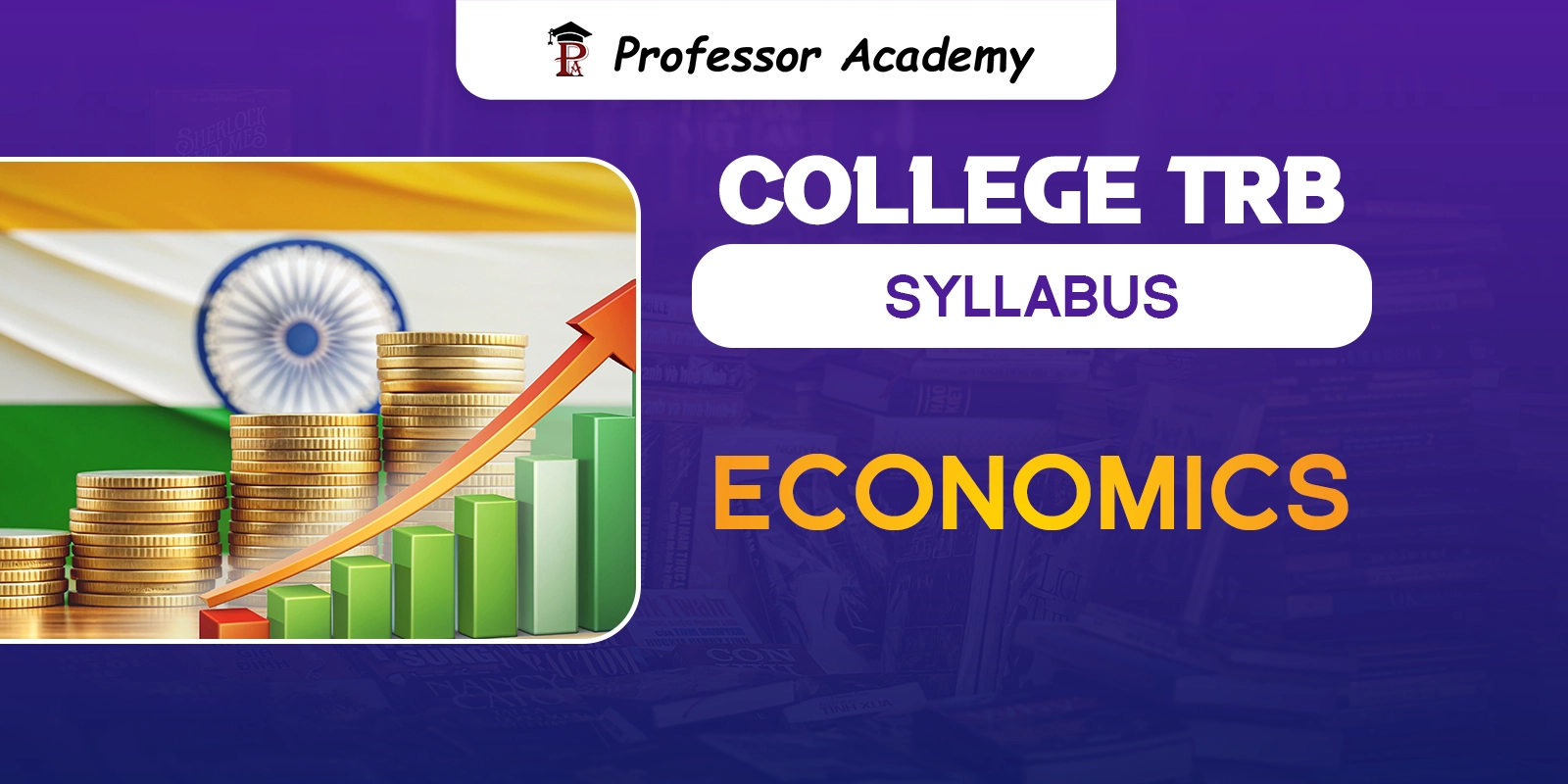TN TRB Assistant Professor Syllabus – Economics

Introduction
The TN TRB Assistant Professor Economics Syllabus provides a detailed framework for candidates preparing for the Tamil Nadu Teachers Recruitment Board (TRB) examination. The syllabus covers core areas such as microeconomics, macroeconomics, international economics, public finance, econometrics, and development economics. It also includes topics on Indian economic systems, monetary theory, and economic policy analysis. This comprehensive structure helps aspirants understand key economic concepts, models, and applications, preparing them for academic and research roles in higher education institutions.
TN TRB Assistant Professor Economics Syllabus
Unit- 1: Micro Economics
• Theory of Consumer Behaviour
• Theory of Production and Costs
• Decision making under uncertainty Attitude towards Risk
• Game Theory – Non Cooperative games
• Market Structures, competitive and non-competitive equilibria and their efficiency properties
• Factor Pricing
• General Equilibrium Analysis
• Efficiency Criteria: Pareto-Optimality, Kaldor – Hicks and Wealth Maximization
• Welfare Economics: Fundamental Theorems, Social Welfare Function
• Asymmetric Information: Adverse Selection and Moral Hazard
Unit- 2: Macro Economics
• National Income: Concepts and Measurement
• Determination of output and employment: Classical & Keynesian Approach
• Consumption Function
• Investment Function
• Multiplier and Accelerator
• Demand for Money
• Supply of Money
• IS – LM Model Approach
• Inflation and Phillips Curve Analysis
• Business Cycles
• Monetary and Fiscal Policy
• Rational Expectation Hypothesis and its critique
Unit- 3: Statistics and Econometrics
• Probability Theory: Concepts of probability, Distributions, Moments, Central Limit theorem
• Descriptive Statistics – Measures of Central tendency & dispersions, Correlation, Index Numbers
• Sampling methods & Sampling Distribution
• Statistical Inferences, Hypothesis testing
• Linear Regression Models and their properties – BLUE
• Identification Problem
• Simultaneous Equation Models – recursive and non-recursive
• Discrete choice models
• Time Series Analysis
Unit- 4: Mathematical Economics
• Sets, functions and continuity, sequence, series
• Differential Calculus and its Applications
• Linear Algebra – Matrices, Vector Spaces
• Static Optimization Problems and their applications
• Input-Output Model, Linear Programming
• Difference and Differential equations with applications
Unit-5 : International Economics
•International Trade: Basic concepts and analytical tools
• Theories of International Trade
• International Trade under imperfect competition
• Balance of Payments: Composition, Equilibrium and Disequilibrium and Adjustment Mechanisms
• Exchange Rate: Concepts and Theories
• Foreign Exchange Market and Arbitrage
• Gains from Trade, Terms of Trade, Trade Multiplier
• Tariff and Non-Tariff barriers to trade; Dumping
• GATT, WTO and Regional Trade Blocks; Trade Policy Issues
• IMF & World Bank
Unit-6 : Public Economics
• Market Failure and Remedial Measures: Asymmetric Information, Public Goods, Externality
• Regulation of Market – Collusion and Consumers’ Welfare
• Public Revenue: Tax & Non-Tax Revenue, Direct & Indirect Taxes, Progressive and non-Progressive Taxation, Incidence and Effects of Taxation
• Public expenditure
• Public Debt and its management
• Public Budget and Budget Multiplier
• Fiscal Policy and its implications
Unit-7 : Money and Banking
• Components of Money Supply
• Central Bank
• Commercial Banking
• Instruments and Working of Monetary Policy
• Non-banking Financial Institutions
• Capital Market and its Regulation
Unit-8 : Growth and Development Economics
• Economic Growth and Economic Development
• Theories of Economic Development: Adam Smith, Ricardo, Marx, Schumpeter, Rostow, Balanced & Unbalanced growth, Big Push approach.
• Models of Economic Growth: Harrod-Domar, Solow, Robinson, Kaldor
• Technical progress – Disembodied & embodied; endogenous growth
• Indicators of Economic Development: PQLI, HDI, SDGs
• Poverty and Inequalities – Concepts and Measurement
• Social Sector Development: Health, Education, Gender
Unit-9 : Environmental Economics and Demography
• Environment as a Public Good
• Market Failure
• Coase Theorem
• Cost-Benefit Analysis and Compensation Criteria
• Valuation of Environmental Goods
• Theories of Population
• Concepts and Measures: Fertility, Morbidity, Mortality
• Age Structure, Demographic Dividend
• Life Table
• Migration
Unit-10 : Indian Economy
• Economic Growth in India: Pattern and Structure
• Agriculture: Pattern & Structure of Growth, Major Challenges, Policy Responses
• Industry: Pattern & Structure of Growth, Major Challenges, Policy Responses
• Services: Pattern & Structure of Growth, Major Challenges, Policy Responses
• Rural Development – Issues, Challenges & Policy Responses
• Urban Development – Issues, Challenges and Policy Responses.
• Foreign Trade: Structure and Direction, BOP, Flow of Foreign Capital, Trade Policies
• Infrastructure Development: Physical and Social; Public-Private Partnerships
• Reforms in Land, Labour and Capital Markets
• Centre-State Financial Relations and Finance Commissions of India; FRBM
• Poverty, Inequality & Unemployment
Download TN TRB Assistant Professor Syllabus – Economics : https://professoracademy.com/wp-content/uploads/2025/10/ECONOMICS-SYLLABUS.pdf
Join our College TRB Tamil Eligibility & Descriptive Paper Coaching: https://professoracademy.com/courses/tn-trb-assistant-professor-tamil-eligibility-paper-2-only/
Join Our College TRB Coaching: https://professoracademy.com/product-category/college-trb
Conclusion
The Economics syllabus for the TN TRB Assistant Professor exam serves as a complete guide for candidates aiming to become educators in the field of economics. With a focus on both theoretical and applied economics, the syllabus enhances analytical thinking, data interpretation, and problem-solving abilities. By following this syllabus with consistent preparation, aspirants can confidently face the examination and contribute to economic education, policy understanding, and academic research in Tamil Nadu’s higher education sector.
For More information
Contact Us : +91 7070701005 / +91 7070701009 / +91 8124408794 / +91 7550100920


